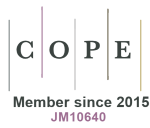Editorial policies
Editorial process | Publication process | Errata, Corrections, Post-publication discussion, Appeals and Complaints
Journal of Circulating Biomarkers is committed to a fair and transparent publication policy. The Editor in Chief and his board are primarily responsible for ensuring a fair review process at the end of which a final decision will be made and notified to the authors. The Editor in Chief is also responsible to select and appoint new members of the board.
Editorial board members (including the Editor in Chief) do not process their own work. Submissions they make to the journal are assigned to independent editors and reviewers, who do not have any conflict of interest with the manuscript and authors. The journal may accept digital advertising, which may be displayed randomly on the website or in communications addressed to the journal's users list. The Journal and its Editors and the Publisher are in agreement that any advertising or commercial revenue will not influence editorial decisions.
Journal of Circulating Biomarkers publishes manuscripts under Creative Commons licenses; article publication is free of charge and fully funded by the sponsor societies. Please visit the open access and copyright section for full details.
Editorial process
All submission to Journal of Circulating Biomarkers are initially screened by the Editorial Office who performs a technical check based on the manuscript being a) complete in all its parts and b) not present potentially plagiarized contents. All manuscripts submitted to the Journal are screened using iThenticate by CrossCheck.
Editor assignment
All suitable submissions are then assigned to the Editor in Chief or Section Editor who will perform an editorial screening to evaluate manuscript which are a) suitable for the section, b) with a sound author background and c) presenting topics of relevance to the journal’s readership. If it is not deemed appropriate it will be rejected immediately. The Editor in Chief or Section Editor will be in charge of selecting and inviting reviewers, evaluating their comments and submitting an editorial recommendation.
Editorial decision
The Editor in Chief will finalize the decision and will inform the authors. The final decision is based on the adequacy of comments supplied by the selected reviewers, the replies supplied by the authors in their revisions and the overall quality of the manuscript. The Editor in Chief can select from accept, reject, ask for revisions or invite additional reviewer(s).
Revisions
Should a revision be recommended, we ask authors to return their revised submission with a point-by-point reply within 2 to 4 weeks. Depending on the extent of changes suggested and how the authors have improved their manuscript, a second round of review may be required.
Peer-review
Journal of Circulating Biomarkers adopts a single anonymized peer-review process, which means that reviewer identity is not made visible to authors, author identity is visible to reviewers, reviewer and author identity are visible to the editors. Reviewers are asked to supply confidential comments and recommendations, which will only be visible to the Section Editor and Editor in Chief, and comments for the authors which are shared in an anonymous way. We invite both external reviewers and members of the Editorial Board, and allow reviewers suggested by authors, although their invitation is decided by the Editors. We allow 7 days for them to agree or decline to perform the review, asking to return their comments within 2 to 4 weeks from accepting the review assignment. Reviewer reports are confidential and are not posted with the articles. Editorials and correspondence may be reviewed and accepted by Editor’s decision. No information about the review process or editorial decision process is published.
Peer review details:
identity transparency: single anonymized
Reviewer interacts with: Editor in Chief and Associate Editors
Review information published: none
Publication process
Accepted submissions will be processed in order of acceptance. Upon acceptance, the corresponding authors will receive a "Licence to Publish” and "Article Processing Charge" forms which will need to be signed and returned to the Publisher in order to proceed with the publication process. The manuscript will then be assigned to a production editor in charge of the entire publication process, who will assign it to style editors with a vast experience in the field the article reports on. No charge is made to the authors for language editing. The corresponding author will receive proofs, which will include all changes made by the style editor, to be corrected and returned within 48 hours. It is the corresponding author’s responsibility to ensure that there are no errors in the proofs. Once approved by the corresponding author, your article will be published online immediately: it will have a DOI number and be fully citable, free to read and download to all.
The final responsibility for published contents rests with the authors and the statements and opinions are solely those of the individual authors and contributors.
Errata, Corrections, Post-publication discussion, Appeals and Complaints
The procedure identified below refer to the need to publish an errata or correction or to file a complaint to the Editor or the Publisher. Complaints are initially handled by the Editor in Chief. If The Editors are the subject of the complaint please contact the publisher by email to editorial@aboutscience.eu
Errata and corrections
Publishing an errata or a correction may be required in case an article has been published with major errors: it must cite the original article and report relevant amendments. Contact the team member who handled your accepted article or write to the publisher by email to editorial@aboutscience.eu, providing as much detail as possible. You will receive full instructions and your request will be followed by the Editorial team.
Retractions
A retraction may be required for major faults in the manuscript: this can be authored either by the authors of the original article or by the Editor and should clearly report the reasons for article retraction, as well as including a complete citation to the original, retracted article. Retractions must be published in a numbered page of the journal to ensure appropriate indexing. An author asking for retraction of his/her published article should contact publisher by email (editorial@aboutscience.eu) and indicate the reasons for the request. The publication team will handle the retraction and provide a feedback.
Post-publication discussion
Letters to the Editor and letters in reply are intended to present opinions or comments on articles published in the Journal. Refer to content type for detailed specifications.
Appeals and Complaints
For appeals against an editorial decision, please send an email to the Editor in Chief (Dr Luiz Zerbini) through the Editorial office (editorial@aboutscience.eu), indicating clearly your concerns, documenting as appropriate your case. The Editor in Chief or Handling Editor will consider the author’s concerns and may seek additional reviewers comments or confirm the initial decision, providing an explanation. Decisions on appeals are final.
Complaints about processes (peer review and production times)
The Editor in Chief and/or Handling Editor, together with editorial assistants will investigate the claim. The complainant will receive appropriate feedback and the feedback will be shared with relevant team members to improve.
Complaint about publication ethics (author's, or reviewer's conduct)
The Editor in Chief and Handling Editors follow the guidelines provided by the Committee on Publication Ethics (COPE). The Editor-in-Chief or Handling Editor will agree on a course of action to investigate the case presented and provide feedback to the complainant by email. Should the complainant be dissatisfied with the handling of their complaint refer to the Facilitation and Integrity team at COPE. More details are available here
Publisher’s ethical standards
The publisher is committed to a fair, ethical and transparent handling of all editorial operations. Its objective is to select and deploy a reliable system to support the submission, peer-review, publication and post publication process, including publishing corrections and retractions if required, as well as establishing connections which are vital for the exchange of data in the ever developing publishing scenario. Each figure involved must ensure an ethical approach, thus:
Editors should:
- ensure that ethical policies are applied as needed, in a consistent manner
- ensure that the review process is handled confidentially
- assess the activity of their reviewers providing useful feedback on their reviewing activity
- ensure the transparency of the peer review process
- ensure that reasons for immediate rejection are explicit
- the decision not to send a paper for peer review should only be based on the academic content of the paper
- declare editorial conflict of interest
Reviewers should:
- be honest, polite, professional and constructive in their comments to the authors
- identify and comment on major strengths and weaknesses of study design and methodology
- comment on ethical concerns raised by the study, or any possible evidence of low standards of scientific conduct
- provide the author with useful suggestions for improvement of the manuscript
- provide the editor with the proper context and perspective to make a decision
- assess research and publication ethics issues
- declare their conflict of interest
Authors should:
- report accurate data and a precise account of the research performed
- provide access to the data used for their submitted article
- submit only original work and refrain from duplicate submission/publication
- ensure that all authors who participated in the study are appropriately listed and ensure that all listed authors meet authorship criteria
- disclose any form of conflict of interest or financial support in their manuscript
- participate in the review process responding promptly to reviewers comments
- notify the Journal immediately should any error or inaccuracy be reported in their manuscript and collaborate to correct or retract the paper
The Publisher should:
- safeguard authors against unethical behavior
- respond timely to queries and concerns from authors, reviewers and editors
- in case of reported misconduct, take action to seek clarity on the situation and to amend the article
- should authors report errors in their published work, publish errata as soon as possible






